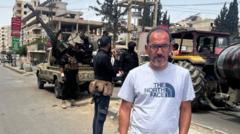On May 9, a BBC Arabic team was embroiled in a life-threatening encounter with Israeli forces while on a reporting mission in southern Syria's Deraa province. The crew, consisting of seven members, including British and Iraqi journalists, aimed to document the ongoing situation near the Israeli-occupied Golan Heights, following Israel's declaration to control a buffer zone indefinitely after changes in the Syrian regime.
As they operated near a UN observation post close to al-Rafeed, Israeli soldiers, monitoring the area, became aware of their presence. Shortly after they began filming, four soldiers approached the team, wielding rifles and demanding they stop filming and place their equipment aside. Despite efforts to convey their identity as journalists, the situation escalated swiftly.
In a message to the BBC's London office, a warning about their situation was sent before the team’s phones and gear were taken. Subsequently, they were escorted to Quneitra, where soldiers combed through their footage while threatening them at gunpoint. After a prolonged two-hour ordeal, the team was split up for questioning, with one member experiencing a particularly invasive strip search and interrogation.
Throughout the hours of detention, the group faced intimidation as soldiers threatened them with severe consequences should they return to the area for further reporting. After seven hours of captivity, the team was dropped off near a rural area outside Quneitra, left disoriented and without means of communication in the darkness. Eventually, they managed to find their way back to safety in Damascus, underscoring the perilous landscape journalists navigate in conflict zones.




















